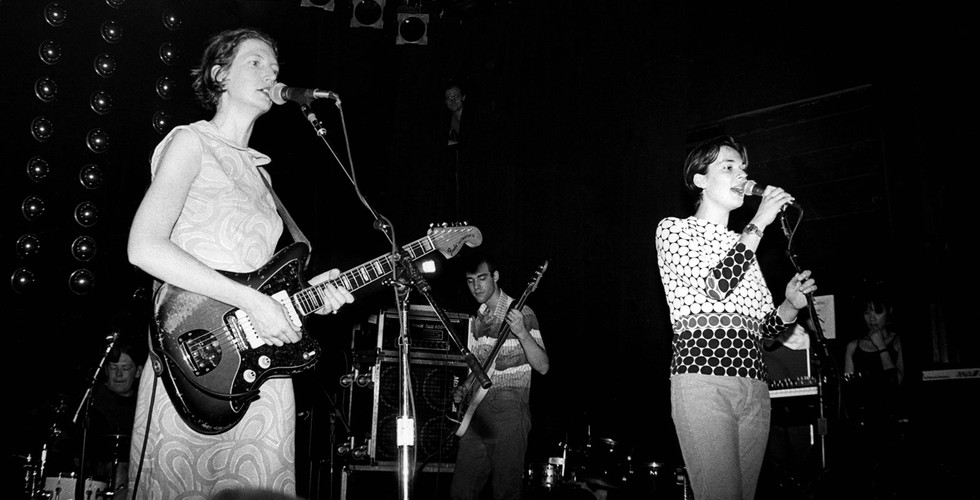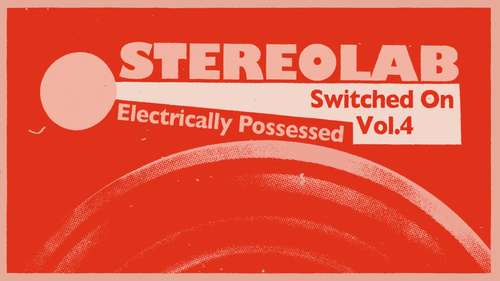Stereolab's Avant-Pop Legacy and New Release "Electrically Possessed"
- Avery Luke
- Mar 20, 2021
- 4 min read
Art by Gabriela Villanueva Hidalgo
Stereolab has released volume four in their Switched On compilation series of “singles and rarities.” The album is called Electrically Possessed, and it includes twenty-five tracks from throughout the band’s career, spanning from the nineties to today.
Stereolab is an experimental pop “groop” led by Latitia Sadier and Tim Gane with a dynamic and dense musical discography. The band formed in London in 1990 following the split of Tim Gane’s band McCarthy. Sadier had met Gane at a McCarthy concert a couple of years prior, and the two became romantic partners and creative collaborators. Stereolab’s first EP, Super 45, was released in May 1991 via their own label, Duophonic.
Stereolab plays at Rough Trade Records in 1991.
The band’s early releases showcase their inventive instrumentation and electronic style, often incorporating obscure synthesizers and various vintage instruments into their songs. Since the beginning, Stereolab’s ability to intertwine facile pop melodies with a wide range of vintage instruments, making for an unexpectedly futuristic sound is what has set the band apart. The band played their first session for John Peel live on BBC Radio 1, just after the release of Super 45. You can listen here.
The three existing compilation albums that precede Electrically Possessed were released in 1992, 1995, and 1998. Though the first volume was a compilation of Stereolab’s earliest releases, the series evolved into a collection of the band’s most notable and/or unreleased tracks.
Beginning in 1992-93, you’ll hear vocalist Mary Hansen harmonizing with Sadier and Andy Ramsay on drums. Stereolab's second studio album Transient Random-Noise Bursts with Announcements takes a bit more of a serious tone. It was released on Elektra Records in the United States and includes some notable tracks for the band including iconic Pack Yr Romantic Mind and eighteen-minute Jenny Ondioline. It was around this time that the band gained popularity among college radio and underground scenes in the United States.
Emperor Tomato Ketchup, released in 1994, sounds funky, ambient, and is ridden with moments of perfect nonsense— in Metronomic Underground, which opens the album and remains one of the groop’s most popular tracks, Sadier harmonizes under Mary Hansen singing “Crazy/Stury/A Torpedo.” Though Stereolab didn’t acquire mainstream praise until later on, it is often their work in the nineties that is hailed for being the most innovative.
Latitia Sadier and Mary Hansen of Stereolab, 1996
Stereolab’s sound developed as inspiration from other genres such as Bossa-Nova and jazz were brought into the mix. Dots and Loops released in 1997 features even more new sounds and themes. Tracks like Rainbo Conversation and Miss Modular represent the dramatic space-age sound that seems to best represent what Gane and Sadier were trying to achieve from the beginning.
Dots and Loops is also appreciated for being arguably their most political album to date, though Stereolab’s music has always been politically expressive, with themes pertaining to leftist politics throughout the years. Diagonals, for example, references “The Great Bourgeoise.” In Brakhage Sadier sings “We need so many damn things / To keep our dazed lives going.”
Stereolab is often mistaken for a Marxist band, likely because of McCarthy’s openness about their Marxist politics and adjacent political commentary throughout the music, but Sadier rather cites leftist and Surrealist philosophers, including Cornelius Castoriadis, as inspiration for her songwriting. Single Ping Pong, which was released a few years prior in 1994, discusses how the “economic cycle tends to revolve.” Sadier sings, “A slump and war / Then peel back to square one and back for more.”
Tim Gane and Mary Hansen
The groop made new strides in the late nineties and early 2000s, releasing their sixth and seventh studio albums, Cobra and Phases Group Play Voltage in the Milky Night and Sound-Dust in 1999 and 2001, respectively. As Stereolab was planning for their next album in 2002, Mary Hansen was killed in a bicycle accident. The band opted to continue making music in spite of the tragedy, releasing EP Instant 0 in the Universe and their eighth studio album, Margarine Eclipse in 2004 which includes a track in dedication to Hansen called Feel and Triple. In 2009, the band would release their last studio album, Chemical Chords, under record label 4AD before taking a hiatus for several years.
In a 2015 interview, Sadier said, “There’s talks of re-releasing some of the Stereolab vinyl albums that we did with Elektra Records— I think there’s seven albums. For contractual reasons, it’s pretty messy and complicated at the moment but we’re looking into re-mastering and repackaging all of these albums which aren’t available anymore.”
Stereolab reunited to tour internationally in 2019, with a complete lineup of members Tim Gane, Lætitia Sadier, Andy Ramsay, Simon Johns, Dominic Jeffrey, Joseph Watson, and Joseph Walters. They re-mastered some older work including Peng! under Warp Records as well, but have been relatively quiet in terms of new releases until now.
Stereolab at Pitchfork Music Festival, 2019
Electrically Possessed has been a long time coming, and is particularly exciting for devout fans given that Stereolab hasn’t released a Switched On compilation in years, the last being Aluminum Tunes [Volume 3], back in 1999. The compilation is a fourth demonstration of Stereolab’s seemingly endless ability to put out avant-pop music unlike anything else.
Electrically Possessed is a lengthy album, so here are some standout tracks—
1. Outer Bongolia:
A nine-minute intro track might seem bold, but Outer Bolognia sets up the rest of the album very well with intertwining, funky sounds. Futuristic electronic elements build on a steady marimba hook throughout the instrumental track.
2. Barock-Plastic
Both thematically and sonically, Barock-Plastic is a good representation of Stereolab. The track represents the space-age sound that Stereolab has grown into. Sadier sings in French, and the lyrics read as an anti-love song.
3. Household Names
Household Names is laid back and jazzy— it’s a great example of Sadier’s specific vocal sound and range.
4. Variation One
This track deviates from Stereolab’s typical format; less steady and more chaotic. Variation One is fitting for the album but has a dissonant and specific sound that makes it solid as a stand-alone track as well.
5. Dimension M2
Originally released as a single ahead of the full-length album, this track is especially catchy and rhythm-focused.















Comments